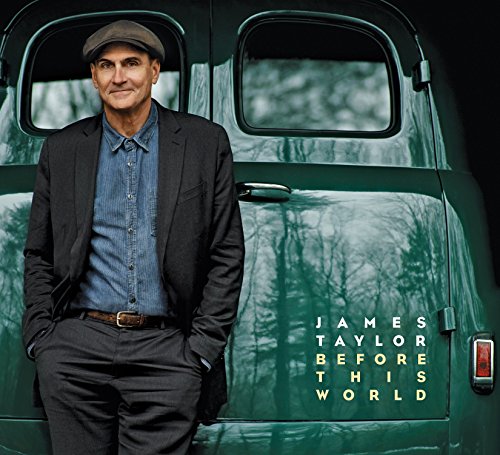
James Taylor
Before This World
Release Date: Jun 16, 2015
Genre(s): Singer/Songwriter, Adult Contemporary, Pop/Rock, Contemporary Pop/Rock, Soft Rock, AM Pop
Record label: Concord
Music Critic Score
How the Music Critic Score works
Buy Before This World from Amazon
Album Review: Before This World by James Taylor
Very Good, Based on 5 Critics
Based on rating 4/5
It’s been 13 years since James Taylor released a studio album of new material. Before This World is full of immaculate playing, tasteful arrangements, polished production and beautifully crafted songs – everything you expect from a JT album except anguished soul-searching. Taylor claims there’s an autobiographical “thru-line” linking his early songs and those on Before… and that’s true, musically, but a 67-year-old looking back from a position of comfort and success has a very different perspective from a 20-year-old mourning the drug-induced death of a friend.
Based on rating 7/10
James Taylor never sets his guitar down -- he spends a good portion of every year satisfying faithful audiences -- but he did rest his pen, opting to sit out the 13 years following the release of 2002's October Road. He kept busy with covers albums and Christmas records, but Before This World finds Taylor returning to writing, a habit he abandoned about a decade prior. Often, Before This World contains echoes of the first decade of the new millennium -- there is a passing reference to 9/11 in a song about Afghanistan and a love letter to the Boston Red Sox's 2004 World Series win -- but Taylor wrote these all in a batch, then recorded them at home with his touring band.
Based on rating 3/5
On his first album of new songs in 13 years — a long wait even by his meticulous standards — James Taylor's past is never far in the rearview mirror. "Somehow I haven't died," he observes in "Today Today Today," the album's back-porch-ready single. "Angels of Fenway" is a poignant reflection on his late grandmother and her devotion to the Red Sox; as he sings, 1965, the year Taylor became a Sox fan, "doesn't seem like a long time ago." The simplicity of the music matches Taylor's nostalgic mood.
Based on rating C+
In the early ‘70s, James Taylor came to define the “confessional” pop songwriter. Music critic William Ruhlmann articulated the troubled artist’s appeal perfectly: “Taylor didn’t break your heart; he understood that it was already broken, as was his own, and he offered comfort.” It’s little wonder then that a reworking of Carole King’s “You’ve Got a Friend” ranks as the highest-charting hit of Taylor’s career. His simple arrangements and calming delivery have always acted like an aloe soothing our wounds — one whose healing properties we trust all the more knowing what we know about the singer’s own suffering.
Opinion: Average
It’s true of so many artists: We don’t want them to change. They’re fine just the way they are, a constant companion through the decades, preferably with no sudden swerves or bumps in the road. James Taylor embodies that type of artist you can rely on. His troubles and motifs have been different over the years, but he has mostly mined the same mellow gold since his rise in the late 1960s as a leading light of the singer-songwriter movement.
'Before This World'
is available now

